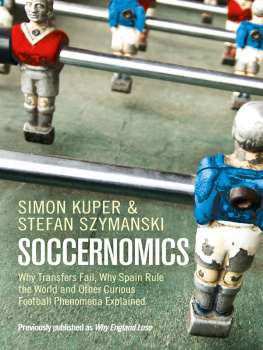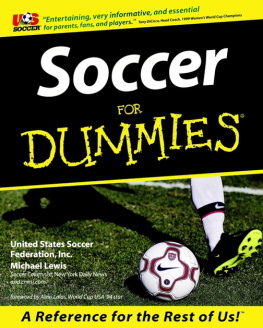
ALSO BY STEFAN SZYMANSKI
Soccernomics: Why England Loses, Why Spain, Germany, and Brazil Win and Why the US, Japan, Australiaand Even IraqAre Destined to Become the Kings of the Worlds Most Popular Sport
(with Simon Kuper; Nation Books, 2009)
Fans of the World, Unite! A Capitalist Manifesto for Sports Consumers
(with Stephen F. Ross; Stanford University Press, 2008)
Il business del calcio
(with Umberto Lago and Alessandro Baroncelli; Egea, 2004)
National Pastime: How Americans Play Baseball and the Rest of the World Plays Soccer
(with Andrew Zimbalist; Brookings Institution, 2005)
Playbooks and Checkbooks: An Introduction to the Economics of Modern Sports (Princeton University Press, 2009)
Winners and Losers: The Business Strategy of Football
(with Tim Kuypers; Viking Books, 1999; Penguin Books, 2000)
Football Economics and Policy
(Palgrave Macmillan, 2010)
The Comparative Economics of Sport
(Palgrave Macmillan, 2010)

Copyright 2015 by Stefan Szymanski
Published by
Nation Books, A Member of the Perseus Books Group
116 East 16th Street, 8th Floor
New York, NY 10003
Nation Books is a copublishing venture of the Nation Institute and the Perseus Books Group.
All rights reserved. Printed in the United States of America. No part of this book may be reproduced in any manner whatsoever without written permission except in the case of brief quotations embodied in critical articles and reviews. For information, address the Perseus Books Group, 250 West 57th Street, 15th Floor, New York, NY 10107.
Books published by Nation Books are available at special discounts for bulk purchases in the United States by corporations, institutions, and other organizations. For more information, please contact the Special Markets Department at the Perseus Books Group, 2300 Chestnut Street, Suite 200, Philadelphia, PA 19103, or call (800) 255-1514, or e-mail .
A catalog record for this book is available from the Library of Congress.
Library of Congress Control Number: 2015936760
ISBN: 978-1-56858-477-5 (e-book)
10 9 8 7 6 5 4 3 2 1
For the fans of Scunthorpe United and all the other clubs who prove that winning is not the only thing
CONTENTS
IN 2007 I MET STEFAN SZYMANSKI AT A CONFERENCE IN ISTANBUL, and almost immediately we were having conversations about soccer that Id never had before. Everyone in soccer has opinions. Stefan, very unusually, had data too. He had been assembling it since the 1980s, a time when almost no serious economist on earth was thinking about soccer. He was even willing to let the data change his opinions. And he could explain his opinions clearly to people who werent economists. So heres one way of thinking about it... was a formulation that Ive become familiar with in the years since.
Further, Stefan is more than an economist. Hes a historian of sports who understands how the origins of professional soccer in nineteenth-century Britain have shaped the games path. By 2009 we had written a whole book together, Soccernomics, and remained friends and interlocutors. Whenever Im wrestling with a question about the soccer business, Stefan is the first person I call.
He also has a distinctive view. Back in 2007, I must admit I shared the conventional wisdom about the soccer business: that it was riding for a fall. At the time I imagined that big banks were entirely safe, but that many big football clubs, with their unpayable debts, risked disappearing. The rich kept getting richer and spending more, and everyone else was overspending in an effort to keep up. When the global financial crisis struck in September 2008, many of us imagined it was the beginning of the end for big soccer. Michel Platini, president of the Union of European Football Associations (UEFA), said that half of Europes professional clubs had financial troubles of some kind. If this situation goes on, he added, it will not be long before even some major clubs face going out of business. I rang Stefan to ask what he thought. Patiently and politely he explained why Platini and I and almost all the other pundits were wrong. Soccer clubs almost never die, said Stefan. This bookStefans mature thinking on soccerexplains why.
As I write, six years into Europes worst economic crisis since World War Two, Stefan has been proven right. No major club anywhere on the continent has gone out of business. If you search hard, you can find about a dozen smaller ones that have collapsed since 2008: UD Salamanca, Lorca Deportiva, and CD Badajoz in Spain; HFC Haarlem, SC Veendam, AGOVV, and RBC Roosendaal in the Netherlands; Beerschot in Belgium; Gretna in Scotland; FC Arsenal Kyiv in Ukraine; and Unirea Urziceni in Romania. Admittedly, Unirea played in the Champions League in 2009/10, but historically it was a tiny club from a small town. It owed its brief rise to a passing sugar daddy. When he lost interest, Unirea expired.
Anyway, several of the defunct clubs were immediately refounded in a slightly different form. Gretna 2008 now plays amateur soccer in Scotland, as do RBC and AGOVV in the Netherlands. Salamanca actually has three successor clubs, each claiming the mantle. In other words, Stefan was prescient to argue that the top end of soccer didnt need the unprecedented, draconian regulation represented by UEFAs misnamed Financial Fair Play rules. That is because he understands the soccer business and its history like no one else.
In this book, Stefan explains that two basic facts have always been part of the soccer business: dominance and distress. Always, there were a few big clubs that dominated, both nationally and in European competitions. Always, most clubs made losses. Unlike American sports, European soccer has never been a profitable industry.
The book shows why dominance and distress persist, and why the industry thrives regardless. Big clubs like Real Madrid and Manchester United built their brands over the decades by winning prizes. They still have to spend heavily each year to maintain their brands because otherwise they will start losing and be rejected by fans. But as long as they are willing to spend, they can dominate the soccer market. Its simply too expensive for their rivals to build comparable brands. Distress, too, is as old as professional soccer. Thats chiefly because very few soccer clubs are out to make profits. Most put every penny they have into trying to win matches.
In this sense, clubs are not like normal businessesand Stefan has always rejected the facile Soccer is a business mantra. Because there are some rival clubs willing to spend even more than their last penny, the inexorable logic is debt. And yet soccer clubs almost never fold, because hardly any creditor wants to pull the plug on a beloved and ancient local institution. Even when a creditor does, its easy enough simply to refound the club at once. In fact, this often happens.
Its true that the recent tendency has been for clubs debt to keep growing. But then clubs revenues keep growing too. Manchester Uniteds debt is in the hundreds of millions, but the clubs estimated market value is nearly $3 billion. In any case, as Stefan points out, very few clubs owe debt to banks. Rather, most owe it to ownersthe modern sugar daddies who have poured $4 billion into English clubs alone since about 2000. Most of these owners are pursuing glory rather than profits. Buying a soccer club is rather like buying a Picasso. It wont make you an annual return, but it will impress your friends, and if one day you want to sell it again, youll probably find youve made a capital gain along the way.
Next page










